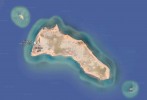Ikarus Observatory is named after a Greek mythology hero: Icarus (Ikarus hereafter). Ikarus is the son of the master craftsman Daedalus, the creator of the Labyrinth. Often depicted in art, Ikarus and his father attempt to escape from Crete by means of wings that his father constructed from feathers and wax. Ikarus's father warns him first of complacency and then of hubris, asking that he fly neither too low nor too high, so the sea's dampness would not clog his wings or the sun's heat melt them. Icarus ignored his father's instructions not to fly too close to the sun, whereupon the wax in his wings melted and he fell into the sea.
But Ikarus is also one the ancient names of the Kuwaiti island of Failaka. Failaka’s name is derived from the Greek word for outpost. But Alexander the Great, according to Geographer Strabo in ca. 25 AD and later by Arrian, gave Failaka the name Ikarus, since it resembled the Aegean island of that name in size and shape. Ikarus is also the name of an ancient city in Failaka
It is the second biggest offshore island of Kuwait situated at the entrance to Kuwait Bay approximately 16 – 17 km far from Ras Al-Ardh in Salmiya and 12 km from Ras As-Sabbiya.
Currently, it is a local tourist hub with hotel and housing accommodations. Light pollution levels are considerably lower in Failaka than mainland Kuwait scoring close to 6.6 on Bortle scale while Ikarus Observatory is located in mainland Kuwait in AlSabahiya city with considerable light pollution.
Construction of the observatory began on September 2015 and finished on November 2015. Robotic automation of the observatory using Ekos Scheduler is in progress.




